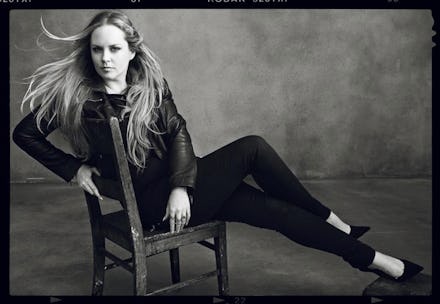Meet the Female Photographer Giving Fashion's Boys' Club a Run for Its Money

Men dominate the fashion industry, and we're not only talking designers. Behind the scenes, and behind the camera, men — often gay men — overwhelmingly outnumber women in all levels of production.
When it comes to fashion photography, this phenomenon only gets worse. Fewer than 10 women made Complex's 2012 list of the "50 Greatest Fashion Photographers Right Now," and only 1.5 of the Richiest's "Top 10 Photographers in the Fashion Industry" were women: Inez Van Lamsweerde, of the team Inez & Vinoodh, and Annie Leibovitz.
But photographer and creative director Sophy Holland wants to change those numbers, and with it, the fashion industry for women. From behind the camera, she's already attracted positive attention for her creative direction, and counts an assortment of high-profile publications (Vogue, Elle, Vanity Fair) and brands (Swarovski, Chandon, Oscar de la Renta) as clients. Committed to respecting and representing women in the best possible light, Holland has positioned herself at the vanguard of a new age in photography, one framed by feminism.
As a child growing up in England, Holland ate fashion for breakfast, doodling in notebooks and creating collages from magazines. "Until I started in my first year at Central Saint Martins College of Arts and Design in London, I had always thought I would be a fashion designer, but my passion for painting and illustrating took over and the stitching and cutting part of my life was left in the dust," Holland told Mic.
Holland is a multifaceted artist. In 2013, she directed her first short film, Brace, about gang violence against gay youth. The short garnered critical accolades at LGBT film festivals around the world, even being shortlisted for the 2014 Iris Prize in London. Her background in traditional oil painting has also influenced her career.
But it was during her time working as creative director for noted Vogue and Vanity Fair photographer Norman Jean Roy that she realized she "wanted to pursue [her] own photographic voice" and "made the leap into shooting full-time."
The importance of having a female photographer: As someone who "despises almost all photographs of herself," Holland understands women's hangups and insecurities. "I go out of my way to make sure they feel their best," she said. "Trust is key." This is part of why Holland sees the role of the photographer as a conductor who "sets the pace of the day, the concept [and] the energy."
Her goal — a lesson she learned from Roy — is to always to "shoot women as subjects and not as objects."
"I am a true supporter and lover of women," Holland said. Her work, especially the below images from the Body Issue of Diva Magazine, reflects this philosophy: "I want to shoot women in heroic and strong lights — not to objectify, but to empower."
Shaking up a man's world: It may seem ironic that men run the fashion industry, but the truth is that a number of barriers hinder women from making inroads within it. "There is a certain nepotism and cronyism involved, and often that speaks to gender or even sexuality, which I think is to be expected," Holland said. "In an industry where we can often 'choose' who we collaborate with, personality and preference naturally play a key role in the selection process, not just on merit alone."
The "good ol' boy mentality," she said, has also resulted in the pervasiveness of sexism throughout the industry: "Often with females in any role of independent leadership, if you are sweet and soft, you are seen as weak, and if you are tough and outspoken, then you're a bitch. I don't believe that the same characteristics in a male photographer would be viewed in the same way. I'm working on finding a balance."
Simply put, men don't think women are up for the job, especially given the physical demands, which they think women can't handle. "You are inevitably going to end up lugging heavy gear around with you, kneeling (or even lying) on the ground to get the shot, and often in extreme weather conditions," Holland said. Women who make the cut, so to speak, are subsequently denigrated and stereotyped as brutish, masculine-types or lesbians.
Holland has made it a point to prove she can be a feminine woman at the top of her game, to buck the sexist and homophobic stereotypes. "I always wear makeup and style my hair for my shoots, try to look as presentable as possible," she said. "It sounds ridiculous to even consider it, but to me it's all part of the brand you're representing."
Holland's feminism, both evident in her ethics and photographic method, is arguably already making a huge impact in the fashion industry and in photography. Counting Leibovitz and Ellen von Unwerth as her heroes, she is undeniably following in their footsteps. "Annie [Leibovitz] is undeniably, especially to the layman, the most well-known photographer alive today," Holland said. "Whether her work is to your taste, you cannot deny what an inspiration she has been to others who follow, especially women. Ellen was a pioneer in fashion portraiture, sexualizing women from a woman's perspective in a fun yet provocative way."
Whatever happens, it's "just the start of this journey for me," Holland said. "To be successful without compromising creative integrity would be amazing."